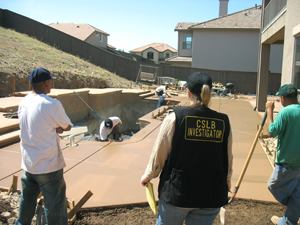MORE INFORMATION
• The View From Texas
How licensing could affect the Texas pool and spa industry.
George Oliveira says he loses anywhere from 50 to 100 jobs a year to unlicensed contractors. The owner of Oliveira Pool Plastering Inc. in La Habra, Calif., doesn’t so much mind the other five or so plastering businesses in the city. It’s the 10 local unlicensed guys he takes issue with.
“It’s rampant in Orange County,” he says. “You’ve got these small companies, and employees eventually get tired of working for someone else, so they branch off and start their own crews. They just fly under the radar and begin working on their own.”
In the Palm Desert area of California, Kent Westfall estimates that 90 percent of the plastering industry operates illegally.
“If it doesn’t stop, the industry won’t exist out here,” says the owner of Kent Westfall Plaster Services in Bermuda Dunes, Calif. Westfall estimates he probably lost upwards of $2.5 million in jobs in 2009 to these contractors, many of whom also underreport their payrolls. “If the state doesn’t continue to work at it, there will be no tax base.”
Indeed, a study conducted by the University of California, Berkeley determined that in 2002, California lost $106 billion in state revenue to underreported payroll taxes. That number had reportedly grown to $200 billion in 2009.
But, at this point, the state doesn’t have the manpower to stop it.
In spite of an ongoing effort by the Contractors State License Board to curtail the problem, the magnitude of California’s underground economy, as well as that of surrounding states, continues to grow.
Here, experts in the pool plastering field — in the Golden State and beyond — weigh in on the extent of the problem, the challenges they face, and some suggestions for confronting unlicensed contracting in their industry.
Challenges
Before the current recession hit, there was plenty of pool plastering work in Phoenix. Because there were more than enough jobs to go around, comparatively little attention was paid to unlicensed contractors, business owners say.
But that all changed in late 2007.
“Because of the economy, you really notice it,” says Victor Murillo, president of Mercury Pool Plastering in Phoenix. “These days I get calls asking of I can do a job for $800 or $1,000 less than I normally would. And I’m already crunched.
“I’ve lowered my price a little in the past to compete with other licensed contractors,” he adds, estimating that perhaps 20 to 30 percent of plasterers in the city are unlicensed. “But when you get calls that are unrealistic, what can you do? [The customers] have to be comparing it to someone that’s unlicensed, or who’s otherwise cutting corners.”
Murillo figures a good 30 percent of his anticipated business in 2009 went to unlicensed plasterers.
One of the problems, he says, is that suppliers don’t care who they sell materials to, as long as they get paid. And since most don’t carry extensive lines of credit, it’s cash all the way.
But in many cases, suppliers have no way of knowing who they are or aren’t supposed to sell to, Westfall adds.
“Builders will find a really cheap plasterer, send them to a supply house, and tell them to put the materials on [the builder’s] account,” he says. “And I’m guessing that gives them as much as a 40 to 50 percent advantage on certain bids.
“Some suppliers think, ‘If we don’t sell to the unlicensed guys, someone else will,’” he adds. “But as it is, you’re enabling it by providing the materials.”
Still, even the most experienced advocates concede it may be unrealistic to ask material providers to police their customers.
“Suppliers don’t want to be made to check the licenses of the people they sell to,” says Jana Auringer, owner of The Pool Lady in Coppell, Texas.
And in some cases the problem is exacerbated when governments attempt to get involved in either the permitting or regulatory process.
Murillo recalls a commercial plastering job he did several years ago. The process, he says, was so time-consuming — three months for all the necessary hoops and red tape — that afterwards he decided to concentrate almost exclusively on residential work.
“It’s a nightmare,” he recalls. “Oftentimes they don’t have enough inspectors. And it took forever. If you want them to expedite the process you have to pay double. In some cases the inspectors don’t even know what they’re looking for. So the state getting involved would be terrible.”
That said, Murillo isn’t likely to begin patrolling his territory, even if he is losing business to his unlicensed counterparts.
“I know there’s a black market out there,” he explains, “but it’s not my position to call the registrar of contractors’ office and tell them who doesn’t have licenses. I have to stay focused on what I’m doing.”
Addressing the problem
Across the country, states are taking incremental steps to curtail unlicensed activity in their jurisdictions.
In 2009, Florida’s Department of Business and Professional Regulation conducted 505 enforcement sting operations, twice as many as it did the previous year.
And undercover sting operations remain the most effective tool for combating unlicensed operators in California, according to CSLB officials. Forms on the agency’s Website allow industry members to notify authorities of suspect contractors and job sites. Officials also can nab perpetrators who have a business card or advertisement.
The majority of calls are related to workers’ comp and payroll tax violators, says David Fogt, chief of enforcement for the Sacramento-based CSLB.
“One of the problems with plasterers is that they’re in and out of the job site so quickly,” he explains. “But we’re always looking for more opportunities to work closely with the plastering industry. We really need the industry to provide us with active job sites and viable leads, and we’d be all over it.”
But most agree the current crisis won’t be solved by government alone.
“The people that are making a living in this industry need to start helping, because the state can’t do it all,” Westfall says. “It’s growing at such a rate that they have to help protect it.”
Removing the demand for cheaper work could ultimately put a major dent in unlicensed work. But how to regulate suppliers if they’re unaware of who their customers really are? Or do you penalize the homeowner for keeping the underground in business?
Whatever the solution, experts concede the issue is becoming too pervasive to address in small bites.
“It’s going to take time, and nothing’s easy. But this is particularly hard because of the size of the problem,” Westfall says. “And any way you look at it, now’s the time for everyone to get involved. We simply aren’t going to have an industry left if we don’t act soon.”



